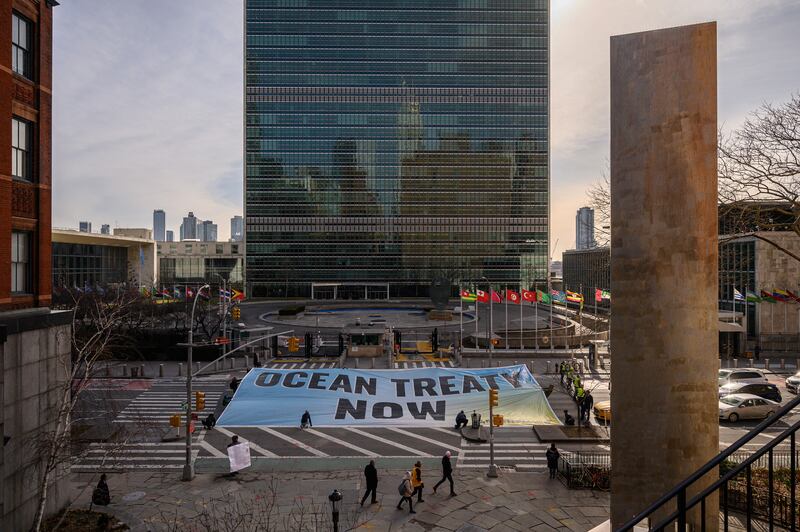Southeast Asian and Pacific leaders are hailing an ambitious United Nations treaty to protect ocean life by establishing protected areas in international waters.
About 193 countries agreed to the legal framework on Saturday night. It comes as ocean life faces growing threats from climate change, overfishing, shipping traffic and seabed mining on the high seas.
“Only 1% of the high seas is currently protected,” Singapore Foreign Minister Vivian Balakrishnan said on Twitter. This “is a timely achievement & major milestone in the conservation & sustainable use of biodiversity in our oceans. It will go a long way towards protecting our global commons.”
The treaty is a culmination of U.N.-facilitated talks that began in 2004. It’s also a crucial first step to meet a goal set in December at the Biodiversity COP15 in Montreal to protect 30 percent of the planet by the end of this decade in an agreement known as “30 by 30.”
Achieving this objective would have been “a fantasy” without the treaty, said marine conservation scientist Daniel Dunn, since there were no established legal processes for creating marine protected areas on the high seas.
The treaty establishes a global framework for sharing ocean resources and managing marine ecosystems, including thorough environmental impact assessments on the potential damage of proposed commercial activities, such as deep-sea mining, before the start of such projects.
The ocean is considered crucial in the fight against the climate crisis, as ocean temperatures continue to rise and threaten marine life. Scientists say ocean ecosystems create half the oxygen humans breathe and limit global warming by absorbing much of the carbon dioxide.
Nearly 10% of marine species are at risk of extinction, according to an International Union for Conservation of Nature report in December, while climate change affects 41% of these threatened species.
Slow, ‘eye-watering’ negotiations
For years, disagreements over funding and fishing rights have caused delays in the negotiations.
Dunn, who has been involved with the negotiations since around 2014, said it was an “eye-wateringly slow discussion about the blindingly obvious need for better mechanisms to protect, assess, and sustainably use the half of the planet beyond the control of any one country.”
The deal was reached following a non-stop two days meeting at U.N. headquarters in New York.
“The ship has reached the shore,” conference Chairwoman Rena Lee of Singapore announced on Saturday.
Official adoption will occur later at another U.N. session after technical editing and translations of the agreed pact. Nations then must ratify the treaty for it to take effect.
The Philippines said it “consistently underlined the principle of common heritage of humankind and importance of giving due regard to the rights & jurisdiction of adjacent coastal states and archipelagic states, which are heavily dependent on the sea.”
It “will provide holistic & equitable management of human activities impacting ocean life beyond national boundaries to safeguard global ocean health & contribute to climate resilience, increased food security for millions of people,” Foreign Secretary Enrique Manalo said on Twitter.
Environmental group Greenpeace called it “a monumental win for ocean protection” that “provides a pathway to creating fully or highly protected areas across the world’s oceans.”

Smaller countries lead the way
Henry Puna, secretary general of the Pacific Islands Forum, also applauded the agreement.
Pacific Island nations, which occupy 20 percent of the world’s economic exclusive zones, have long advocated for an international, legally binding instrument to preserve marine life in areas beyond national jurisdiction.
Laura Meller, oceans campaigner for Greenpeace Nordic, said the European Union, the United States and China among others “were key players in brokering the deal,” showing “willingness to compromise.”
But so was a coalition of developing nations known as the Group of 77.
“Small Island States have shown leadership throughout the process, and the G77 group led the way in ensuring the treaty can be put into practice in a fair and equitable way,” Meller said.
The legally binding pact, called the Biodiversity Beyond National Jurisdiction treaty, represents the first common framework agreement on ocean protection since the adoption of the 1982 U.N. Convention on the Law of the Sea, which established the high seas as an area where all nations can conduct fishing, shipping and research.
Undiscovered biodiversity
The “high seas” is outside of any country’s jurisdiction, beginning at the border of countries’ exclusive economic zones that extend up to 370 km (200 nautical miles) from coastlines. It makes up more than 60 percent of the world’s oceans by surface area and is home to millions of species and ecosystems.
Just 1.2% of these international waters, a vast reserve of undiscovered biodiversity, are protected.
Conservationists say sharing marine genetic resources derived from plants and animals in the ocean that could benefit society, including in pharmaceuticals, food and industrial sectors, was another point of contention.
The treaty “articulates a new regime for access and benefits sharing of marine genetic resources, which have already been used to develop extremely lucrative pharmaceuticals by corporations and countries who can afford to access these deep and distant areas,” Dunn, who teaches at the University of Queensland, said in a statement.
Radio Free Asia is a news agency affiliated with BenarNews.
